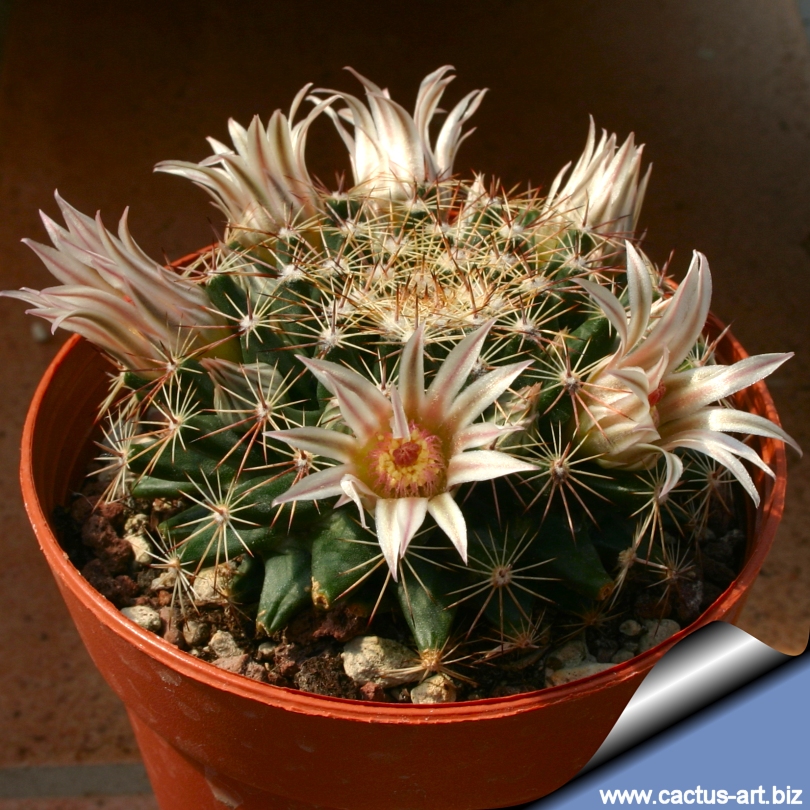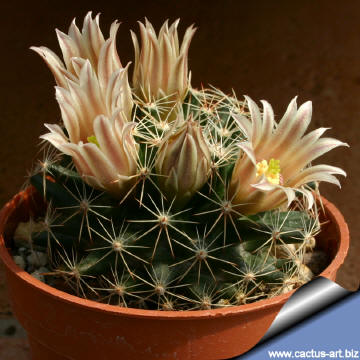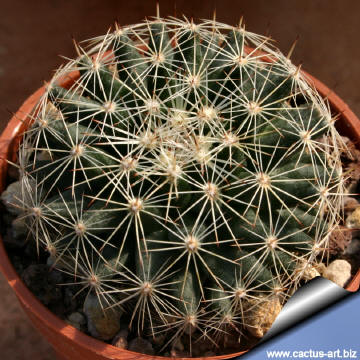|
|
|

As the name indicates "applanata" means "flattened" this is a plant of
small height, a fairly rare trait in cacti of this genus for most
Mammillarias.
|
Description: It is a low
growing solitary plant and one of the most cold hardy of the
Mammillaria. Of the related taxon belonging to Mammillaria
heyderi complex the Mammillaria applanata is often
the flattest but otherwise very similar to the other species and may
probably repesent only a race of the same species.
Stem: Much flattened to globose, green to dark green, more than
10 cm in diameter and only 2.5 to 5 cm tall with a depressed crown
covered with white wool. With latex.
Tubercles: 9-20 × 3-7 mm, elongated pyramidal or conical, ±
flattened andangular. Their axil is naked or slightly woolly at first.
Areoles: Young areoles very woolly.
Radial spines: Approx 10 to 20 per areole, widely spreading,
bristly, needlelike, whitish to pale bron, lower ones darker than the
upper, 5 to 12 mm long.
Central spines: 1 stronger, porrect, erect coloured brown with a
black tip.
Blooming season: Flowers, appears in April-May
Flowers: About 2 cm long and up to 3.5 cm broad, cream to pinkish
on the inside with greenish or brownish midveins. Outer perianth segment
greenish, lanceolate, accuminate, margin not ciliate. Flower buds
pointed greenish. Filaments whitish, sorter than the style, Stigma lobes
greenish.
Fruit: Red, nacke, more than 3 cm long maturing in
Augus-March.often requires a full year to mature.
Seeds: Brownish-red.
|
|
 |
 |
|
Advertising
|
|
|
|
|
Family:
Cactaceae
(Cactus
Family)
M. heyderi var. applanata (Engelmann)
Engelmann
In: Proc. Amer. Acad. 3:263. 1856
Accepted
Scientific name: Mammillaria
heyderi Muehlenpfordt var. heyderi
In: Allg. Gartenz. 16:20 (1848)
Origin: Texas, New Mexico and Oklahoma USA;
Tamaulipas, Nuevo Leon, Coahuila, Durango, Sonora, San Luis Potosi and
Veracruz, Mexico. (the var. applanata is restricted to
central and southern Texas)
Habitat: Chihuahuan desert
scrub, Tamaulipan thorn scrub, and Edwards Plateau, usually limestone
and alluvial substrates; 10-2000 m;
Conservation status: Listed in
CITES appendix 2.
Synonyms:
- Mammillaria applanata Engelmann
In: Wislizenius, Mem. Tour North. Mexico 105 1848
- Mammillaria gummifera var. applanata (Engelmann) L.
D. Benson 1969
- Mammillaria declivis Dietrich
In: All. Gartenz 18:235. 1850
- Mammillaria texensis Labouret
In: Monogr. Cact. 89. 1853
- Cactus texensis
In: Rev. Ge. Pl. 1:261. 1891
- Cactus heyderi
- Mammillaria parrasensis
- Neomammillaria heyderi
Related
taxa:
M. heydery ssp. heyderi It has 1 central spine and 15-22
radial spines; Flowers are cream coloured with brownish-greenish
mid-veins.
M. heydery ssp. gaumeri It has one central spine and 10-12
radial spines; Flowers are plain creamy-white.
M. heydery ssp. gumifera. It has 1-2 central spines and
10-12 radial spines: Flowers are reddish-white with darker midviens.
M. heydery ssp. hemisphaerica. It has 1 central spine and
9-13 radial spines; Flowers are Cream-colored to dusty pink.
M. heydery ssp. macdougalii. It has 1-2 central spines
which are stouter and 10-12 radials spines; Flowers are cream-colored to
pale yellow.
M. heydery ssp. meiacantha. It has one to none central
spines and 5-9 radial spines; Flowers are pink or white with pink mid-viens.
M. heyderi var. applanata It is often the flattest
but otherwise very similar to the The ssp. heyderi and may probably
repesent only a race of the same species.
|
|
|
Cultivation: This is an easy to grow species, don't requires any
special treatment, but need as much light as possible without burning
the plant to encourage the heaviest spine formation. Needs a very good
drainage with regular water in summer, dry in winter. Avoid any frost.
Propagation: Seeds, offsets (Allow cut surface to callous over
before planting)
|
|
Photo of conspecific taxa, varieties, forms and
cultivars of Mammillaria heyderi.


|
|